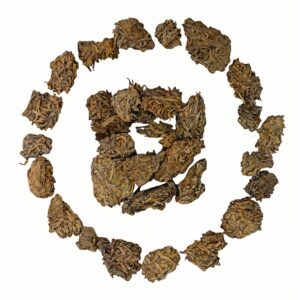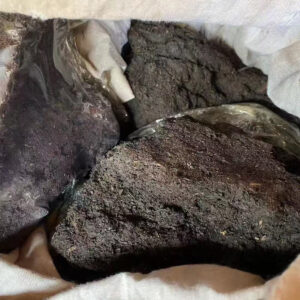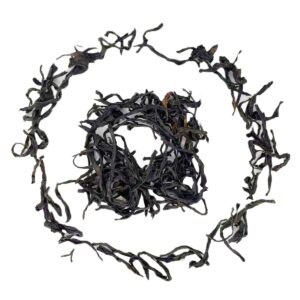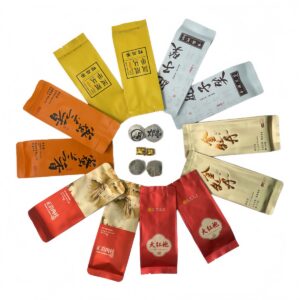Description
The history of Liuan Dark Tea dates back to the Tang Dynasty, where Lu Yu’s The Classic of Tea (Cha Jing) documented “Lu Zhou Liuan Tea,” marking it as one of the earliest tribute teas.
During the Qing Dynasty, it became both a royal tribute and diplomatic gift, mentioned by Empress Dowager Cixi and referenced in the literary classic Dream of the Red Chamber. Its production declined due to wartime turmoil in modern times but gradually revived after the 1980s, eventually earning recognition as a National Intangible Cultural Heritage.
Liuan Dark Tea has long been attributed with medicinal value. Ming Dynasty scholar Tu Long noted in Kao Pan Yu Shi (Remaining Notes for Carefree Living) that it was “most effective for medicinal use.” Renowned Qing Dynasty physician Nian Xiyao further employed aged Liuan Dark Tea as a herbal guide to treat smallpox, with his prescription preserved in the Supplement to the Compendium of Materia Medica (Ben Cao Gang Mu Shi Yi). Its dampness-removing and detoxifying properties are widely acknowledged, revered by the populace as the “Sacred Tea.”
Liuan Dark Tea, also known as “Bamboo Basket Tea,” undergoes its aging process wrapped in wild indocalamus leaves before being compressed into bamboo baskets and re-fired for shaping.
Our 2003 vintage Liuan Dark Tea has been aged for 22 years. Matured Liuan Dark Tea possesses a mild nature, making it ideal for individuals with sensitive digestion to consume during autumn and winter. It warms the stomach, strengthens the spleen, and modern studies suggest its potential to alleviate cold symptoms.
The dry leaves initially release woody, herbal, and bamboo aromas. The liquor offers a robust texture with a lingering sweetness. Steeping the packaging indocalamus leaves alongside the tea imparts a subtle bamboo fragrance, which may help soothe throat discomfort.
Liuan Dark Tea transcends mere beverage status—it embodies the ceremonial traditions and ecological wisdom of Chinese tea culture. Its production involves 16 meticulously orchestrated steps, including compression in bamboo baskets and wrapping with indocalamus leaves, showcasing the artisanal mastery of traditional craftsmanship.

Brewing Methods for Liuan Dark Tea
Traditional Boiling Method:
Combine 5 grams of tea leaves with the packaged indocalamus leaves and boil together. After the water reaches a rolling boil, simmer over low heat for 5 minutes before decanting and serving.
Gongfu Brewing (Gaiwan/Yixing Clay Teapot):
Use 5 grams of tea leaves along with the packaged indocalamus leaves. Brew with boiling water (100°C). Rapidly decant the first three infusions (10-15 seconds each). From the fourth infusion onward, extend brewing time to 20-25 seconds. The tea exhibits exceptional brewing endurance, lasting over 10 infusions, with the final brews still offering a lingering aftertaste.












